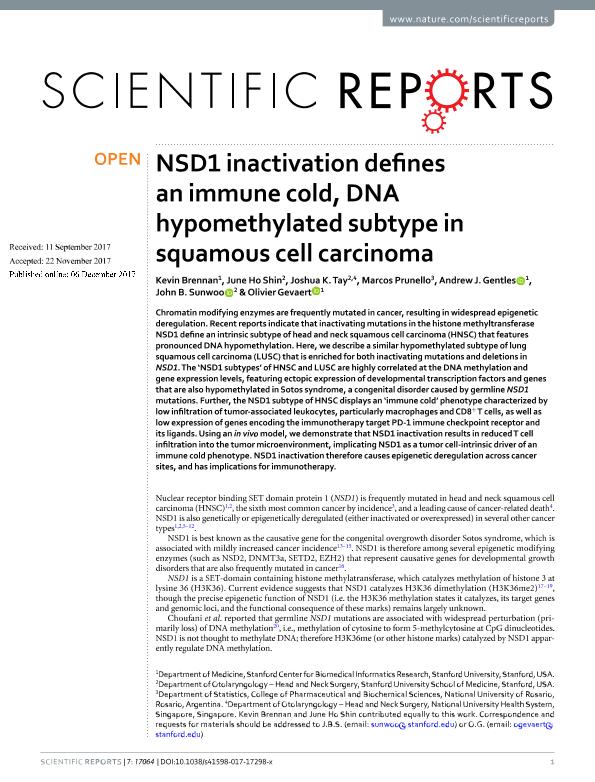Mostrar el registro sencillo del ítem
dc.contributor.author
Brennan, Kevin
dc.contributor.author
Shin, June Ho
dc.contributor.author
Tay, Joshua K.
dc.contributor.author
Prunello, Marcos Miguel

dc.contributor.author
Gentles, Andrew J.
dc.contributor.author
Sunwoo, John B.
dc.contributor.author
Gevaert, Olivier

dc.date.available
2018-06-28T17:17:34Z
dc.date.issued
2017-12
dc.identifier.citation
Brennan, Kevin; Shin, June Ho; Tay, Joshua K.; Prunello, Marcos Miguel; Gentles, Andrew J.; et al.; NSD1 inactivation defines an immune cold, DNA hypomethylated subtype in squamous cell carcinoma; Nature Publishing Group; Scientific Reports; 7; 1; 12-2017; 1-12
dc.identifier.issn
2045-2322
dc.identifier.uri
http://hdl.handle.net/11336/50389
dc.description.abstract
Chromatin modifying enzymes are frequently mutated in cancer, resulting in widespread epigenetic deregulation. Recent reports indicate that inactivating mutations in the histone methyltransferase NSD1 define an intrinsic subtype of head and neck squamous cell carcinoma (HNSC) that features pronounced DNA hypomethylation. Here, we describe a similar hypomethylated subtype of lung squamous cell carcinoma (LUSC) that is enriched for both inactivating mutations and deletions in NSD1. The 'NSD1 subtypes' of HNSC and LUSC are highly correlated at the DNA methylation and gene expression levels, featuring ectopic expression of developmental transcription factors and genes that are also hypomethylated in Sotos syndrome, a congenital disorder caused by germline NSD1 mutations. Further, the NSD1 subtype of HNSC displays an 'immune cold' phenotype characterized by low infiltration of tumor-associated leukocytes, particularly macrophages and CD8+ T cells, as well as low expression of genes encoding the immunotherapy target PD-1 immune checkpoint receptor and its ligands. Using an in vivo model, we demonstrate that NSD1 inactivation results in reduced T cell infiltration into the tumor microenvironment, implicating NSD1 as a tumor cell-intrinsic driver of an immune cold phenotype. NSD1 inactivation therefore causes epigenetic deregulation across cancer sites, and has implications for immunotherapy.
dc.format
application/pdf
dc.language.iso
eng
dc.publisher
Nature Publishing Group

dc.rights
info:eu-repo/semantics/openAccess
dc.rights.uri
https://creativecommons.org/licenses/by-nc-sa/2.5/ar/
dc.subject
Cancer Genomics
dc.subject
Dna Methylation
dc.subject
Head And Neck Cancer
dc.subject
Immune Evasion
dc.subject
Immunotherapy
dc.subject.classification
Ciencias de la Computación

dc.subject.classification
Ciencias de la Computación e Información

dc.subject.classification
CIENCIAS NATURALES Y EXACTAS

dc.title
NSD1 inactivation defines an immune cold, DNA hypomethylated subtype in squamous cell carcinoma
dc.type
info:eu-repo/semantics/article
dc.type
info:ar-repo/semantics/artículo
dc.type
info:eu-repo/semantics/publishedVersion
dc.date.updated
2018-06-28T14:15:39Z
dc.journal.volume
7
dc.journal.number
1
dc.journal.pagination
1-12
dc.journal.pais
Reino Unido

dc.description.fil
Fil: Brennan, Kevin. University of Stanford; Estados Unidos
dc.description.fil
Fil: Shin, June Ho. University of Stanford; Estados Unidos
dc.description.fil
Fil: Tay, Joshua K.. National University Health System; Singapur. University of Stanford; Estados Unidos
dc.description.fil
Fil: Prunello, Marcos Miguel. Universidad Nacional de Rosario. Facultad de Ciencias Bioquímicas y Farmacéuticas; Argentina. Consejo Nacional de Investigaciones Científicas y Técnicas; Argentina
dc.description.fil
Fil: Gentles, Andrew J.. University of Stanford; Estados Unidos
dc.description.fil
Fil: Sunwoo, John B.. University of Stanford; Estados Unidos
dc.description.fil
Fil: Gevaert, Olivier. University of Stanford; Estados Unidos
dc.journal.title
Scientific Reports
dc.relation.alternativeid
info:eu-repo/semantics/altIdentifier/doi/http://dx.doi.org/10.1038/s41598-017-17298-x
dc.relation.alternativeid
info:eu-repo/semantics/altIdentifier/url/https://www.nature.com/articles/s41598-017-17298-x
Archivos asociados
